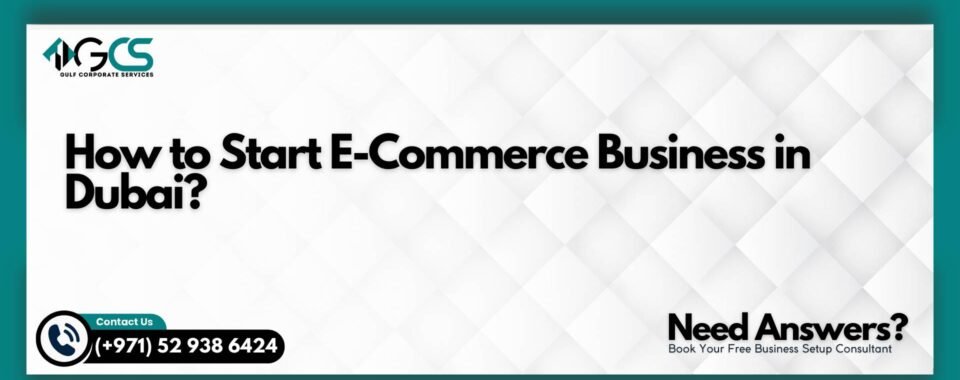
Dubai’s strategic location, booming economy, and business-friendly environment have made it a hotspot for entrepreneurs and businesses worldwide. With the exponential growth of the digital economy, starting an e-commerce business in Dubai is a lucrative opportunity. This guide will take you through the entire process, ensuring you understand all aspects of establishing a successful e-commerce business in Dubai.
Understanding E-Commerce Business Setup in Dubai
The E-Commerce Landscape in Dubai
Dubai is a pioneer in adopting technology and digital innovation, making it a fertile ground for e-commerce businesses. The city’s diverse population, high internet penetration rate, and robust logistics infrastructure contribute to a thriving e-commerce ecosystem. As of 2024, the e-commerce market in Dubai is expected to grow significantly, driven by increasing consumer demand for online shopping and a supportive regulatory framework.
Why Choose Dubai for E-Commerce?
- Strategic Location: Dubai’s geographical position makes it an ideal hub for accessing markets in the Middle East, Africa, and Asia.
- World-Class Infrastructure: The city offers state-of-the-art logistics, warehousing, and transportation facilities.
- Business-Friendly Policies: Dubai’s government promotes a pro-business environment with various incentives for startups.
- Technological Advancements: Dubai is at the forefront of adopting cutting-edge technologies, providing a competitive edge to businesses.
Conducting Market Research and Feasibility Study
Before embarking on your e-commerce journey, conducting thorough market research is crucial. Understanding the local market dynamics, consumer preferences, and competitive landscape will help you make informed decisions.
Key Steps in Market Research
- Analyze Market Trends: Study the latest e-commerce market trends in Dubai. Identify the products or services in high demand and the consumer segments driving this demand.
- Identify Target Audience: Define your target audience based on demographics, purchasing behavior, and preferences. This will help you tailor your marketing strategies effectively.
- Competitor Analysis: Research your competitors to understand their strengths, weaknesses, and market positioning. Identify gaps in the market that your business can fill.
- Assess Demand and Supply: Evaluate the demand for your products or services and the existing supply in the market. This will help you determine the viability of your business idea.
Choosing the Right Business Model
Selecting the appropriate business model is a critical decision that will impact your operations, revenue streams, and overall success. In e-commerce, several business models are prevalent, each with its own advantages and challenges.
Common E-Commerce Business Models
- Business-to-Consumer (B2C): This model involves selling products directly to consumers. It’s the most common e-commerce model and includes online retail stores.
- Business-to-Business (B2B): In this model, businesses sell products or services to other businesses. It’s often used by wholesalers and manufacturers.
- Consumer-to-Consumer (C2C): This model involves consumers selling to other consumers, typically through online marketplaces like eBay.
- Dropshipping: This is a retail fulfillment method where the store doesn’t keep the products it sells in stock. Instead, when a store sells a product, it purchases the item from a third party and ships it directly to the customer.
Factors to Consider When Choosing a Business Model
- Target Market: Consider who your customers are and how they prefer to shop.
- Product Type: Some products are better suited for certain business models. For example, niche products may perform well in a dropshipping model.
- Resources and Capabilities: Evaluate your resources, such as capital, expertise, and technology, to determine the most feasible business model.
Obtaining an E-Commerce License in Dubai
To operate an e-commerce business legally in Dubai, you need to obtain an e-commerce license. The Department of Economic Development (DED) in Dubai issues these licenses. The process involves several steps, including choosing a trade name, submitting required documents, and paying the necessary fees.
Steps to Obtain an E-Commerce License
- Choose a Trade Name: Select a unique and appropriate trade name for your business. Ensure it complies with the naming guidelines set by the DED.
- Submit Documents: Prepare and submit the required documents to the DED. These typically include a copy of your passport, a copy of your visa, a passport-sized photo, and a detailed business plan.
- Pay the Licensing Fees: Pay the necessary fees for the e-commerce license. The cost can vary depending on the type of business and other factors.
- Approval and Issuance: Once your application is reviewed and approved, you will receive your e-commerce license. This allows you to operate your e-commerce business legally in Dubai.
Understanding Dubai E-Commerce Business Regulations
Dubai has specific regulations governing e-commerce activities. These include consumer protection laws, data protection regulations, and guidelines for online transactions. It’s essential to stay updated on these regulations to ensure compliance and avoid legal issues.
Setting Up Your Online Store
Your online store is the face of your e-commerce business. Choosing the right platform and designing an attractive, user-friendly website are crucial steps in establishing your online presence.
Choosing the Best E-Commerce Platforms
There are several e-commerce platforms available, each offering different features and capabilities. Popular platforms include Shopify, Magento, WooCommerce, and BigCommerce. When choosing a platform, consider factors such as ease of use, scalability, customization options, and integration capabilities.
Designing a User-Friendly Website
- User Experience (UX): Ensure your website offers a seamless and intuitive user experience. Focus on easy navigation, fast loading times, and a responsive design that works well on both desktop and mobile devices.
- Aesthetics: Design an attractive and visually appealing website that reflects your brand identity. Use high-quality images, clear fonts, and a consistent color scheme.
- Product Listings: Create detailed and accurate product listings with high-quality images, descriptions, and prices. Include customer reviews and ratings to build trust.
- Checkout Process: Simplify the checkout process to reduce cart abandonment rates. Offer multiple payment options and ensure the checkout process is secure.
Integrating Secure Payment Gateways
Payment gateways are essential for processing online transactions. Popular payment gateways in Dubai include PayPal, Stripe, and local options like Telr and PayTabs. Ensure the payment gateway you choose supports multiple currencies and offers robust security features to protect customer data.
Marketing Strategies for E-Commerce in Dubai
Effective marketing is key to driving traffic to your online store and converting visitors into customers. A mix of digital marketing strategies can help you reach your target audience and achieve your business goals.
Digital Marketing Strategies
- Search Engine Optimization (SEO): Optimize your website for search engines to improve your visibility and attract organic traffic. Focus on high-quality content, relevant keywords, and technical SEO.
- Social Media Marketing: Leverage social media platforms like Facebook, Instagram, and Twitter to engage with your audience, promote your products, and drive traffic to your website.
- Content Marketing: Create valuable and engaging content that resonates with your audience. This can include blog posts, videos, infographics, and more.
- Email Marketing: Build an email list and use email marketing to nurture leads, promote products, and retain customers. Personalize your emails to increase engagement.
- Paid Advertising: Invest in paid advertising options like Google Ads, Facebook Ads, and Instagram Ads to reach a larger audience and drive targeted traffic to your website.
Logistics and Fulfillment Services
Efficient logistics and fulfillment services are vital for the success of your e-commerce business—partner with reliable logistics providers to ensure timely delivery of products to your customers.
Choosing Reliable Logistics Solutions
Dubai offers a range of logistics providers specializing in e-commerce fulfillment. Consider factors such as delivery speed, coverage area, cost, and reliability when choosing a logistics partner.
Exploring E-Commerce Fulfillment Services
Fulfillment services can handle warehousing, packaging, and shipping of your products. This can help you scale your business and focus on core activities. Popular fulfillment services in Dubai include Aramex, DHL, and Fetchr.
Ensuring Timely Delivery
Timely delivery is crucial for customer satisfaction. Implement efficient inventory management systems and track your shipments to ensure products reach customers on time.
Understanding Legal and Regulatory Requirements
Compliance with local laws and regulations is crucial for running a successful e-commerce business in Dubai. Stay updated on the latest e-commerce legal requirements, including VAT regulations, data protection laws, and consumer rights.
Key Legal Requirements
- VAT Compliance: Ensure your business complies with VAT regulations in Dubai. Register for VAT if your annual turnover exceeds the threshold and submit regular VAT returns.
- Data Protection: Implement robust data protection measures to safeguard customer information. Comply with the UAE’s data protection laws and best practices.
- Consumer Rights: Understand and respect consumer rights in Dubai. Provide clear information about your products, prices, and return policies.
- Business Transparency: Maintain transparency in your business practices. Disclose all relevant information to your customers and avoid misleading claims.
Leveraging Technology and Innovation
Stay ahead of the competition by leveraging the latest technology and innovations in the e-commerce industry. Invest in e-commerce software development, mobile app development, and digital transformation to enhance your business operations and customer experience.
Investing in E-Commerce Software Development
Custom e-commerce software can offer features tailored to your business needs. Work with experienced developers to create a scalable and secure e-commerce platform.
Developing a Mobile App
With the increasing use of smartphones for online shopping, having a mobile app can provide a competitive edge. A mobile app can enhance the user experience and increase customer engagement.
Embracing Digital Transformation
Digital transformation involves integrating digital technology into all areas of your business. This can include automating processes, using data analytics, and adopting innovative technologies like AI and blockchain.
Unlock the Potential of Your E-Commerce Business in Dubai
Starting an e-commerce business in Dubai offers immense potential for growth and success. By following the steps outlined in this guide, you can navigate the complexities of setting up and running an e-commerce business in Dubai with confidence. From obtaining the necessary licenses to leveraging technology and innovation, every aspect of your e-commerce venture can be optimized for success in this vibrant market.
At GCS Group, we are a business setup company in Dubai dedicated to helping entrepreneurs and businesses establish their presence in this dynamic city. Our expertise in e-commerce business setup, legal compliance, and digital marketing ensures that your venture is well-positioned for success. Let us guide you through the process and help you achieve your business goals in Dubai’s thriving e-commerce landscape.








